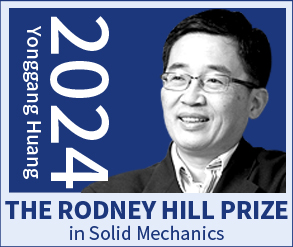Plenary Lectures
Yonggang Huang wins the Hill Prize 2024

A rapidly expanding research area involves the development of routes to shape programmable three-dimensional (3D) structures with feature sizes in the mesoscopic range (that is, between tens of nanometres and hundreds of micrometres). A goal is to establish methods to control the properties of materials systems and the function of devices, through not only static architectures, but also morphable structures and shape-shifting processes. Soft matter equipped with responsive components can switch between designed shapes, but cannot support the types of dynamic morphing capabilities needed to reproduce continuous shape-shifting processes of interest for many applications. Challenges lie in the establishment of 3D assembly/fabrication techniques compatible with wide classes of materials and 3D geometries, and schemes to program target shapes after fabrication. In this talk, I will introduce a mechanics-guided assembly approach that exploits controlled buckling for constructing complex 3D micro/nanostructures from patterned two-dimensional (2D) micro/nanoscale precursors that can be easily formed using established semiconductor technologies. This approach applies to a very broad set of materials (e.g., semiconductors, polymers, metals, and ceramics) and even their heterogeneous integration, over a wide range of length scales (e.g., from 100 nm to 10 cm). To allow realization of 3D mesostructures that are capable of qualitative shape reconfiguration, we devise a loading-path controlled strategy that relies on elastomer platforms deformed in different time sequences to elastically alter the 3D geometries of supported mesostructures via nonlinear buckling. I will also introduce a recent work on shape programmable soft surface, constructed from a matrix of filamentary metal traces, driven by programmable, distributed electromagnetic forces that follow from the passage of electrical currents in the presence of a static magnetic field. Under the guidance of a mechanics model-based strategy to solve the inverse problem, the surface can morph into a wide range of 3D target shapes and shape-shifting processes. The compatibility of our approaches with the state-of-the-art fabrication/processing techniques, along with the versatile capabilities, allow transformation of diverse existing 2D microsystems into complex configurations, providing unusual design options in the development of novel functional devices.
Yonggang Huang received B.S. (1984) from Peking University, and M.S. (1987) and Ph.D. (1990) from Harvard University. He has taught at University of Arizona, Michigan Technological University, University of Illinois at Urbana-Champaign, and is the Jan and Marcia Achenbach Professor at Northwestern University. He has received awards for teaching and undergraduate student advising at all these universities. His current research interests include mechanics of stretchable electronics, and mechanics-guided deterministic 3D assembly. He is a member of US National Academy of Sciences, US National Academy of Engineering, American Academy of Arts and Sciences, a foreign member of Royal Society (London), Chinese Academy of Sciences, and Royal Society of Canada.
The Rodney Hill Prize for 2024 has been awarded to Professor Yonggang Huang, Achenbach Professor of Mechanical Engineering, Civil and Environmental Engineering, and of Materials Science and Engineering at Northwestern University, USA.
This prize is presented once every four years at the International Congress of Theoretical and Applied Mechanics (ICTAM), the next occasion being August 2024 at ICTAM 2024 in Daegu, South Korea. The Prize of $25,000 is awarded to a single scientist for outstanding research in solid mechanics over the previous decade. Younger researchers are equally eligible for consideration as those who are more established, and the work should be of great current interest (representing, for example, an emerging field of application of solid mechanics or a significant breakthrough in an established branch of the subject). The prizewinner is determined by a small committee whose members are internationally distinguished in solid mechanics.
The international panel of experts considered many strong nominations from a diverse field. Professor Yonggang Huang receives the prize for his applications of solid mechanics to several emerging fields of significant societal impact, specifically for his work during the last 10 years on mechanics-guided, deterministic 3D assembly and fractal mechanics for stretchable electronics. His work in these areas is having profound impact on materials science, electronics, energy storage, biomedical engineering and manufacturing.
Professor Yonggang Huang comments:
'The award of the Hill Prize is a singular and unexpected honor. I thank IUTAM for selecting me and Elsevier for its support.‘
His prize lecture will take place at 10am on Wednesday 28th August at ICTAM 2024:
Program at a GlanceCongratulations to Yonggang Huang from the Rodney Hill Prize Scientific Committee and the Elsevier Team!
Winners of the Hill prize
2024 Yonggang Huang
2020 Vikram Deshpande
2016 Raymond Ogden
2012 Huajian Gao
2008 Michael Ortiz
*The Rodney Hill Prize in Solid Mechanics are founded and supported by Elsevier.